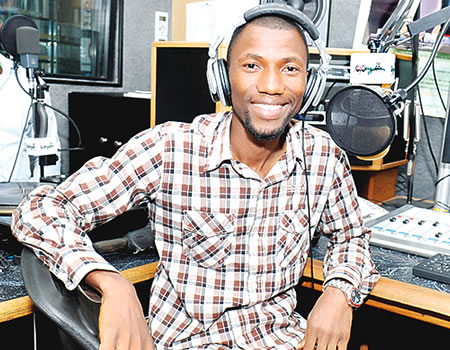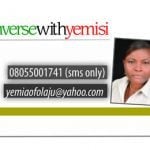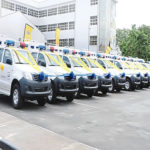What did you study in school?
I studied Computer Engineering at the University of Benin.
How did you start out as a comedian?
I have been doing comedy for a long time. I started out late 1996. So, tentatively, it has been twenty years.
Were you in school at the time?
Yes, as a matter of fact, I was finishing secondary school then.
In Lagos?
No, in Warri (Delta State). I was born and bred in Warri. And started comedy there, in my church (Channel of Life Ministry). I was the drummer for our choir. We had a lot talents, you know, young people doing stuff. But from the beginning, I knew I was going to be in the entertainment industry. But I didn’t know how it will happen. The entertainment industry wasn’t as big as it is now. Secondly, everybody’s parents wanted them to become doctors, engineers or accountants. So, I was a bit confused most of the time as a young man. No university was doing any comedy related course.
There is the Theatre Arts?
Yes, but at that time, I didn’t see my talent as an art.I convinced myself that the only thing I could do was to study Medicine. After trying JAMB for several times I had to cross over to Computer Engineering. So, while I was in school, I was doing comedy. I was one of the comedians RMD called to flag-off the “Made in Warri Comedy Show”. Ali Baba saw me at the show, he asked what I was doing in Warri. Then he invited me to Lagos. I relocated officially in January 2004.That was how I moved into Ali’s house.
The house at Lekki Phase 1?
Yes, I will never forget those days. He taught me the business side of comedy and the professional outlook. He taught me everything I know.
Would you say you were fortunate?
Yes, my brother I was. The platform from which I came to Lagos was huge and the opportunities I had when I came to Lagos was also rare. I don’t think most of my colleagues had the same privilege. This is an aspect of my career that I regard highly, one of the reasons I work to stay on top of my game. I want to make him (Ali Baba) proud. He gave me the stepping stone. I was able to mingle with a lot of people and learnt a lot as a Warri boy, (Warri no dey carry last).
How did you come by the name IGOS?
The name IGOS is an acronym of my full name: Iledia (is my family name) Grandball (my father’s name and the name of my company), Omoro and Samson. The acronym came to me when I needed to create a brand for myself.
Why did you make the transition to broadcasting?
I was already a brand in Warri. As a matter of fact, I was coming to Lagos for shows from Warri. I was also on Opa Williams’ “A Night of a Thousand Laughs” show in 2004. I became part of the team after I finally relocated. I was also handling MC at events. In spite of all of that, I nursed a secret passion for broadcasting. And take it or leave it, broadcasting is part of entertainment. It gave me a platform to do comedy. As a professional comedian, you don’t have regular means of self-expression, except at shows. And shows don’t come every day. So, with radio, my passion and talent came together.
How did you get the Wazobia FM platform?
In 2010, I worked with Basketmouth. I was part of his first ever “Lord of the Ribs” show. I was in charge of the media. That was actually when I came to Wazobia FM. I quickly made friends with some of the staff. Dotun, who is also my friend, jokingly asked if I could work for Wazobia. I was interested. Mr Arije, the administrative personnel, asked me to drop my recording, which I did. The following day I was called for an interview. I didn’t plan for it. But I knew that the opportunity would come. I just didn’t know where, how and when. Now, I am really grateful that I have the Wazobia FM platform
So, how was your first day on air?
My first day at Wazobia FM was awesome and challenging. You know, being a Warri boy, pidgin na our thing, but sometimes when they put you behind the mic, you would realise that there is no space between you and the mic. So, you learn to control and manage the things that come from your mind. You learn to think ahead of the people listening to you. You learn to think smarter so that you don’t hurt them, or say something that would go against NBC laws.
These were the first things I had to learn and I was like, “Wow!”I was a bit nervous the first, though I had done a series of radio interviews. It was a different ball game. I had to learn the process of being a radio show host. I’m really happy with the people that I worked with. They taught me everything. According to the history of Wazobia FM, I was the fastest learner.I learnt how to control everything in less than two weeks.
When did you host your first show?
It was exactly two weeks after I was employed. I was assigned to host the night shift because the guy who was on duty was going on leave. I did my best.
Merging radio with your comedy, how did you cope?
We disseminate information, we also entertain people. Radio, for me, was a platform to improve on my daily creativity. It helped me to be spontaneous. As a comedian, you encounter hecklers on stage, people who try to unsettle you. We call them“Yabbi”. They are there to test you, to know if you are spontaneous. Radio helped me to be spontaneous. Beside that I love music. All of that I found in radio.
Was it difficult connecting with your fans on radio?
No. It was very easy. My social media accounts are the extension of my work on radio. Whatever I do on road, I do on my social media accounts and anyone can contact me through them. That is the way I connect with people. Besides that, I live a free life. As long as you respect me, I do not have any reason not to relate well with you.
Are there things you have stopped doing since you became popular?
Yes. The only major thing I wish I did often is using the bus. Most times I don’t feel like driving to work. The traffic situation in Lekki, Lagos always discourages me. Sometimes, I want to get on a bus. There was a day I tried it. I gave the conductor money and he gave me change without asking about my bus stop. When I asked, he told me where I worked and who I am. After he said that, other people started looking at me in the bus. You know, it is some of the embarrassing moments that we get that make us not to do certain things.
Your comedy show, “IGOS Live”hasn’t been held this year.
Yes. I have done like five seasons since inception every June. I didn’t do it this year because of some projects I was involved in. I had postponed these project for the past two years.
Are the projects work-related?
No.
Some of your fans may have been anticipating it?
Yes. To be honest I am a family man. And there is a limit to the risk you can take. Besides the projects I was doing, I wasn’t sure that if I invested the money I have now, I would be able to recoup it. You know everybody is complaining about the recession.
So, the recession is the reason you didn’t do the show?
Somewhat, my brother. What I am trying to do now is to penetrate the international market. I had a show in Canada in February this year. It was well-attended, sold out.
Was it IGOS Live?
Yes, my prompter there suggested I do a complete show in October. We will be going to five cities in Canada. The concept is the Nigerian Independence Day Celebration. We want to celebrate Nigeria in Canada with the show.
Which comedians would you be working with?
Some of my colleagues in Nigeria will be part of it, and I will be using some Nigerian comedians abroad as well. The likes of Kenny Blaq, Accapella, Jide, Sheyi Brown, MC PC among others. I also hope to have one or two musicians in the show too.
What is your opinion about using pidgin for comedy abroad?
We use light pidgin abroad. But the truth is 90 per cent of people that come for our shows abroad are Nigerians in the diaspora. So, they understand the language. And sometimes, some don’t want us to use Pidgin because that’s what they miss over there. Regardless, we use light pidgin because the 10 per cent of the crowd would either be white friends or other Africans abroad. We also have white people who are interested in Nigerian comedy in attendance.






